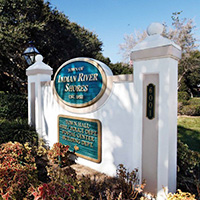 Utility saga: Court vindication would be too late to help Shores
Utility saga: Court vindication would be too late to help Shores
STORY BY LISA ZAHNER (Week of September 21, 2023)
Vero Beach has now argued that the Florida Supreme Court should reject the chance to take up the Town of Indian River Shores’ breach of contract utility dispute with the city.
But even if the justices review the briefs, take up the case and rule in favor of the Shores, that vindication would likely arrive too late to be of much value.
It would be too late to be a relevant factor in the town’s decision over whether to tell Vero – by an April 1, 2024, deadline – that the Shores will leave the city’s water-sewer system in Oct. 1, 2027.
It would be too late to save Shores water-sewer ratepayers from paying yet another round of double-digit rate hikes on their water and sewer bills starting in October.
The city’s rate schedule of increases is necessary to fund the planned state-of-the-art wastewater treatment plant at the Vero Beach Regional Airport – a project that is set to cost a quarter billion dollars including interest.
Even if the town breaks up with Vero Beach Utilities in 2027 or in 2042 to get water-sewer service from Indian River County Utilities or another provider, Shores residents will dig into their pockets to help pay for a new sewer plant they won’t benefit from for generations to come.
The dispute centers around a 2012 water-sewer franchise agreement purportedly entered into in good faith by Vero Beach and Indian River Shores. Vero promised the town it would match Indian River County Utilities rates and cut the county’s competitive pitch for the Shores’ utility business off at the knees.
That deal worked for more than seven years until the county slashed its rates on reuse irrigation water used to sprinkle lawns and golf courses.
Vero claimed it could not match those costs without running in the red financially. When Vero failed to match the new county rates, Indian River Shores sued for breach of contract, asking the court to enforce the 2012 promise. Vero won in circuit court, the town appealed and lost, leaving Florida’s high court as a last resort.
The Shores legal team, headed up by Bruce May and Kevin Cox of the Holland and Knight law firm, has argued that the core case shares much in common with a 1955 ruling in which the Florida Supreme Court forced the City of Gainesville to follow through on a promise to give the University of Florida free water service – even though Gainesville was losing money and Gainesville residents were subsidizing that free water and free water infrastructure.
Calling the town’s case feeble, pointless and misleading, Vero’s legal team from the Gray Robinson law firm in its Sept. 6 brief pointed toward the precedent-setting “1903 Tampa Waterworks case” as the gold standard for setting out what a municipal utility has the power to do.
The 1903 Tampa Waterworks ruling allows a municipal utility to renege on an otherwise binding contract if the terms of that contract give away the municipality’s rate-making power. That statutory “reserved powers” legal doctrine, the city argues, should carry the day as it did with the trial court and the Fourth District Court of Appeals.
“The Town inexplicably ignores over a century of directly applicable utility rate-making jurisprudence and instead alleges conflict with this court’s Gainesville case. The Gainesville case was not a rate case; it dealt with an entirely separate legal concept,” the city’s brief states. This allegedly sacrosanct rate-setting power, coupled with a prohibition on forcing the city’s other customers to subsidize lower rates paid by Town of Indian River Shores residents, are written in state statute and that should prevail, the city says.
The city’s first brief was rejected by the Clerk to the Florida Supreme Court for a technical sufficiency error in the format of the submission, so the city had to file a corrected brief.
The Florida Supreme Court is not required to take up the case, but it can choose to address it to clarify some point of law, or to document how this case does or does not relate to or conflict with precedent set by either the 1955 City of Gainesville ruling or the 1903 Tampa waterworks ruling.



